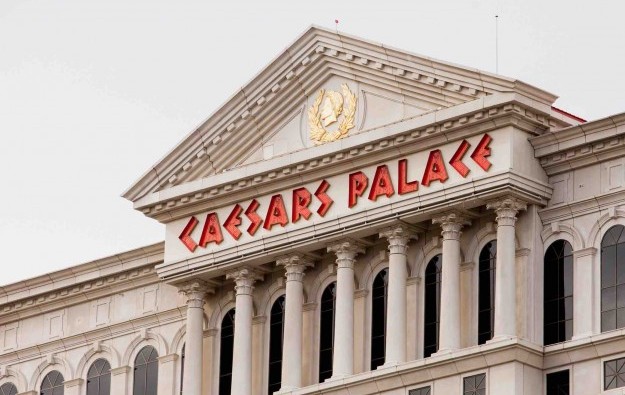US$9.5 mln penalties for AML failure at Caesars Palace
Sep 09, 2015 Newsdesk Latest News, Top of the deck, World

Caesars Entertainment Corp’s bankrupt casino operating unit has been ordered by U.S. federal and Nevada regulators to pay financial penalties totalling US$9.5 million for “systemic and severe” deficiencies in the way it dealt with money linked to high roller gamblers from Asia and elsewhere.
A total of US$8 million is in the form of a civil penalty agreed between Caesars Palace (pictured) – the firm’s flagship casino resort on the Las Vegas Strip – and the Financial Crimes Enforcement Network (FinCEN) of the U.S. Treasury, for what FinCEN said was “wilful and repeated violations” of the Bank Secrecy Act. The remainder of the penalty is in the form of a fine imposed by Nevada regulators for breaching state law.
The U.S. Bank Secrecy Act requires casinos with gross annual revenue in excess of US$1 million, to file suspicious activity reports. They can be analysed by government agencies.
An emailed statement sent to media outlets in the U.S. from a financial public relations firm working for Caesars Entertainment, said: “Since the time of the examination, Caesars Palace has made substantial improvements to every aspect of its Bank Secrecy Act/anti-money laundering compliance programme and continues to enhance the programme.”
The statement on behalf of Caesars added: “The entire Caesars organisation is committed to full compliance with the requirements applicable to casinos and to taking effective risk-based measures to prevent and detect money laundering.”
FinCEN statement
“Several failures at Caesars caused systemic and severe AML [anti-money-laundering] compliance deficiencies,” said FinCEN.
They related to private gaming rooms at the resort, reserved for the venue’s wealthiest customers. FinCEN said they are people that in some cases are willing to gamble millions of U.S. dollars in a single visit.
Despite the “elevated money laundering risks” associated with the private gaming areas, Caesars Entertainment failed to impose appropriate AML scrutiny, allowing some of the “most lucrative and riskiest financial transactions” to go unreported, said FinCEN. Caesars also marketed the private rooms through branch offices in the U.S. and abroad, particularly in Asia, but failed adequately to monitor related transactions – such as large wire transfers – for suspicious activity, the body added.
“Caesars knew its customers well enough to entice them to cross the world to gamble and to cater to their every need,” said FinCEN director Jennifer Shasky Calvery. “But, when it came to watching out for illicit activity, it allowed a blind spot in its compliance programme. Every business wants to impress its customers, but that cannot come at the risk of introducing illicit money into the U.S. financial system.”
The Wall Street Journal newspaper reported – quoting details of the settlement that FinCEN didn’t include in its press statement – that one foreign customer’s US$50,000 cash deposit into a Caesars’ Hong Kong bank account wasn’t flagged as suspicious, as U.S. regulations require, and the casino didn’t inquire about the source of the funds. FinCEN also identified lax oversight at Caesars’ Singapore, Tokyo and Monterey Park, California, branch offices, said the newspaper.
Caesars Entertainment Operating Co Inc petitioned for bankruptcy in January. That status is pending. Although the US$8-million payment would reportedly end a two-year FinCEN investigation over alleged violations of the Bank Secrecy Act, Caesars Entertainment Operating Co will need the consent of the bankruptcy court to confirm the settlement, said FinCEN. Caesars Palace is involved in the bankruptcy reorganisation process.
FinCEN announced in June it had assessed a US$75-million civil financial penalty against the then operators of Tinian Dynasty Hotel and Casino, in the Commonwealth of the Northern Mariana Islands (CNMI), a U.S. jurisdiction in the Pacific Ocean. In July it was reported that Tinian Dynasty was forfeiting US$3.04 million as part of a non-prosecution agreement made with the U.S. Department of Justice.
In August 2013, global casino operator Las Vegas Sands Corp – with operations in Macau and Singapore as well as the U.S. – confirmed it would pay US$47.4 million to the U.S. federal government to end a federal probe regarding failure to report a high roller’s allegedly suspicious cash deposits in Nevada. As part of the settlement, the firm was told it would not face prosecution action over the matter.
Related articles
-
 LVS group refinancing likely hailed by...
LVS group refinancing likely hailed by...Apr 23, 2024
-
 LVS in new US$1.5bln unsecured...
LVS in new US$1.5bln unsecured...Apr 05, 2024
More news
-
 Donaco EBITDA up y-o-y to above US$4mln...
Donaco EBITDA up y-o-y to above US$4mln...Jul 26, 2024
-
 HK listed Palasino upgrades Czech...
HK listed Palasino upgrades Czech...Jul 26, 2024
Latest News
Jul 26, 2024
Border-casino operator Donaco International Ltd has achieved a 164.17-percent year-on-year increase in its latest quarterly group earnings before interest, taxation, depreciation and amortisation...Sign up to our FREE Newsletter
 (Click here for more)
(Click here for more)
Pick of the Day
”We’ve got more traction outside of Macau at the moment. But Macau’s going be a bigger focus for us”
David Punter
Regional representative at Konami Australia
Most Popular
 Sheraton brand to exit Londoner Macao, to be Londoner Grand July 25, 2024
Sheraton brand to exit Londoner Macao, to be Londoner Grand July 25, 2024  Macau regulator probes unlicensed gaming agents July 24, 2024
Macau regulator probes unlicensed gaming agents July 24, 2024  Philippines gives 20k aliens in POGOs 60 days to leave July 25, 2024
Philippines gives 20k aliens in POGOs 60 days to leave July 25, 2024  Philippines-listed DigiPlus says not affected by POGO ban July 24, 2024
Philippines-listed DigiPlus says not affected by POGO ban July 24, 2024  Sands China 2Q EBITDA down q-o-q amid low hold, renovation July 25, 2024
Sands China 2Q EBITDA down q-o-q amid low hold, renovation July 25, 2024






